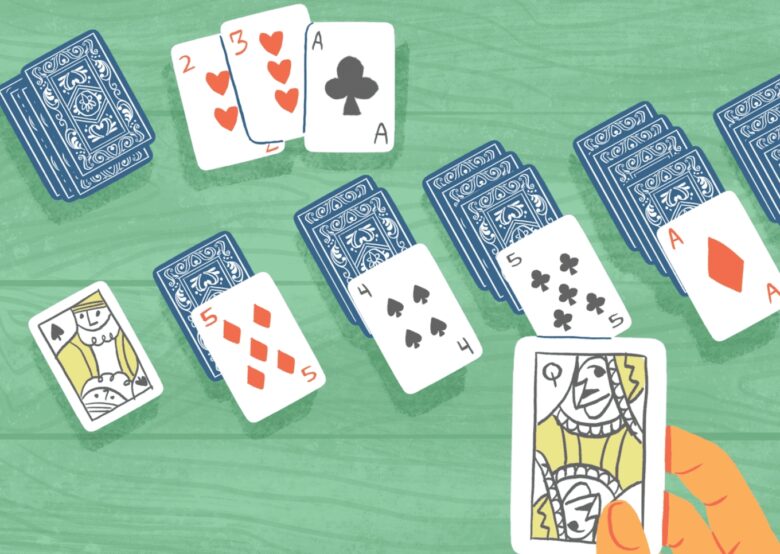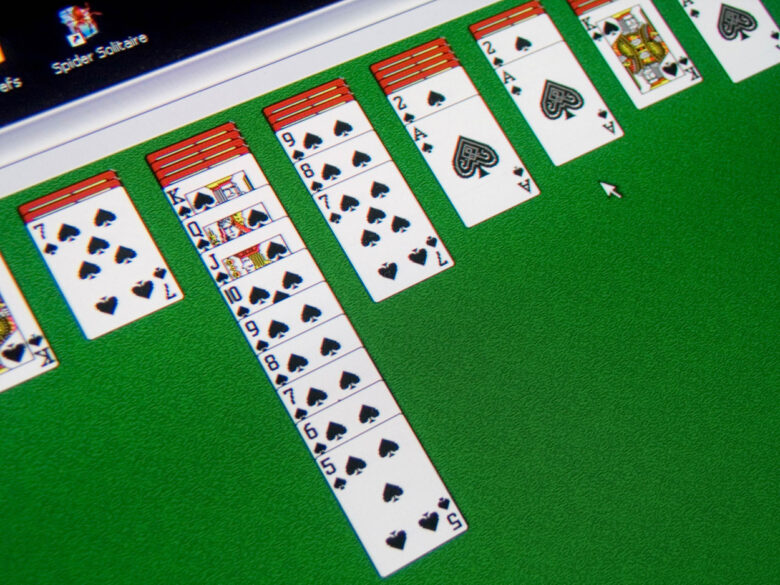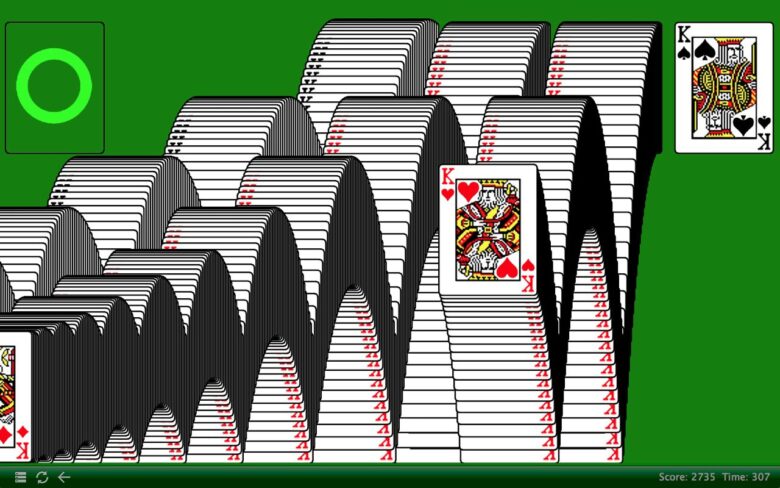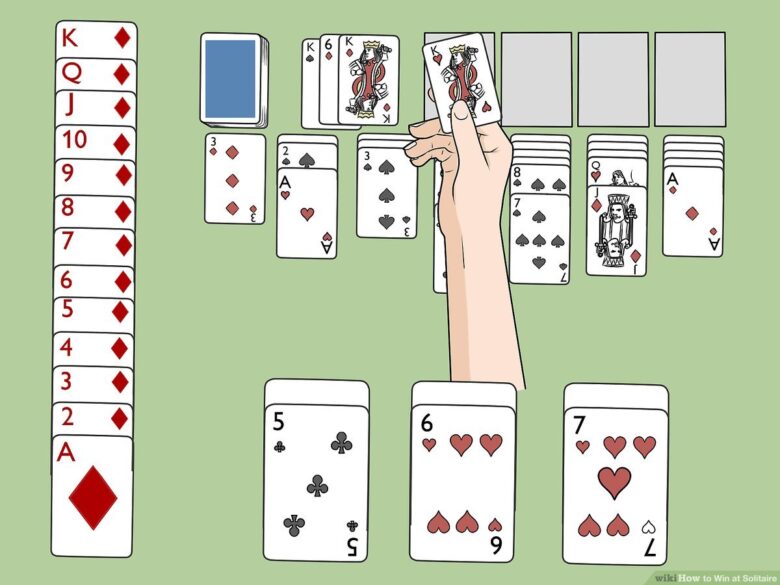Solitaire, a game that has stood the test of time, continues to captivate players worldwide with its simple yet intricate gameplay. Known primarily as a card game played by a single individual, Solitaire encompasses a variety of different versions, with Klondike being the most renowned. This article delves into the enduring debate surrounding Solitaire: is it predominantly a game of skill or luck? By examining the gameplay strategies and the nature of the game itself, we aim to shed light on this question.
Contents
The Essence of Solitaire
At its core, Solitaire is about arranging a shuffled deck of cards in a specified order and layout, adhering to certain rules and constraints. The player’s goal varies depending on the version of Solitaire being played but typically involves building sequences of cards in foundation piles, starting with Aces and ending with Kings, each suit in its stack. If you want to play, check out free hard solitaire.

Source: thesprucecrafts.com
The Role of Luck
The influence of luck in Solitaire cannot be understated. The initial deal of the cards is purely random, setting the stage for the game and significantly impacting the potential for victory. In some deals, the cards may align in a manner that makes the game relatively straightforward to solve, while other deals might present an insurmountable challenge from the outset. This randomness is a fundamental aspect of the game, ensuring that each round of Solitaire is a unique puzzle.
The Skill Factor
While luck determines the starting point, skill plays a pivotal role in navigating the game. A skilled player utilizes strategic thinking, problem-solving, and foresight to maximize their chances of winning. This involves making decisions on which cards to move, anticipating the consequences of these moves, and managing the tableau and the stockpile efficiently. The ability to recognize patterns and think several steps ahead is crucial, as is the skill to adapt strategies based on the evolving state of the game.
Analyzing Gameplay Strategies
Successful Solitaire players employ various strategies to tilt the odds in their favor. One such strategy involves prioritizing moves that uncover hidden cards, thereby increasing the available options and potential moves. Another tactic is to maintain a balance between building card sequences and freeing up tableau columns, as empty columns can be incredibly valuable for maneuvering cards around.
Furthermore, experienced players are judicious in their use of the stockpile, often refraining from moving cards to the foundation too hastily unless doing so opens up significant opportunities on the tableau. This strategic patience allows for greater flexibility and control over the game’s progression.

Source: sciencetimes.com
The Impact of Variants
The question of skill versus luck in Solitaire also depends on the specific variant being played. Some versions, like Freecell, are designed in such a way that nearly all deals are solvable with the right strategy, emphasizing skill over luck. Conversely, other variants may offer less control over the outcome, increasing the influence of the initial deal and, by extension, the role of luck.
Psychological and Cognitive Aspects
Playing Solitaire is not just a mechanical exercise of moving cards according to rules; it also involves psychological and cognitive elements. The game challenges the player’s patience, decision-making under uncertainty, and ability to handle frustration when faced with difficult or unsolvable deals. The development of these skills over time can enhance a player’s proficiency in the game, further highlighting the skill component of Solitaire.
The Luck-Skill Continuum
Viewing Solitaire purely as a game of skill or luck is overly simplistic. It is more accurate to place it on a continuum, with luck and skill both playing significant roles in different measures. The initial deal is a matter of luck, setting the stage for the game. From that point onward, skill becomes the primary factor that determines the outcome, with the player’s decisions, strategies, and adaptability shaping the path to victory or defeat.

Source: pinterest.com
The Social and Cultural Perspective
The perception of Solitaire as a skill or luck-based game also varies across different social and cultural contexts. In some circles, the game is seen as a light, luck-based pastime, suitable for casual entertainment. In others, it is recognized as a complex, skill-based challenge that rewards strategic thinking and expertise. This diversity in perception underscores the multifaceted nature of Solitaire, encompassing elements of both luck and skill.
Adaptive Strategy: The Key to Mastery
Adaptive strategy is a critical element in mastering Solitaire. This approach involves the player’s ability to modify their tactics in response to the unfolding game state. An adept Solitaire player recognizes when their initial strategy is not yielding the desired results and is flexible enough to pivot to a different approach. This might mean changing the focus from uncovering hidden cards to creating empty tableau columns, or vice versa. The hallmark of a skilled player is not just their adherence to a set of predefined strategies, but their capacity to adapt those strategies in real-time, responding to the game’s demands as they evolve.

Source: apps.apple.com
Psychological Resilience and Patience
Another aspect that underscores the role of skill in Solitaire is the psychological resilience and patience required to excel at the game. The random nature of the card deals means that not every game is winnable, and players must learn to cope with the frustration of unwinnable scenarios. The ability to maintain focus and patience, even in the face of seemingly insurmountable odds, distinguishes seasoned players from novices. This mental fortitude, coupled with the continuous refinement of strategy and decision-making skills, contributes significantly to a player’s success in Solitaire.
Summary
Solitaire is a multifaceted game where the interplay of luck, skill, and psychological resilience shapes the player’s experience. While the initial shuffle of the deck introduces an element of chance, the strategies employed, the ability to adapt to the game’s evolving landscape, and the mental resilience to persist through challenging deals underscore the skill-based nature of Solitaire. Players who master these aspects find a deeper, more rewarding engagement with the game, transcending its surface-level simplicity.
